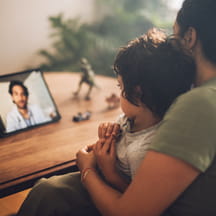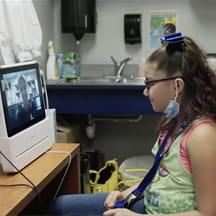Breastfeeding can benefit both mother and baby; it can also present challenges to mom.
“Moms who are breastfeeding put so much pressure on themselves,” says Nicole Wallin, a certified lactation consultant with Children’s Physicians in Omaha, Nebraska. “What they read on social media isn’t always accurate, and breastfeeding isn’t as ‘natural’ as it is often portrayed. Whether we counsel moms during in-person visits or virtual visits, it’s reassuring for them to have a solid resource for facts, guidance and support.”
Children’s Physicians, whose pediatricians practice in partnership with Children’s Hospital & Medical Center and Creighton University School of Medicine’s pediatrics training program—both in Omaha—launched a telehealth program offering instruction and support through virtual visits with a certified lactation consultant in the fall of 2018.The number of women using the service is growing.
Comfort and ease of use
Virtual visits are 60 minutes long and use an app similar to FaceTime and Skype. Since most moms today are from the millennial generation, they are comfortable with videoconferencing, says Wallin. The virtual visit is also convenient for new moms, especially those living far away from centers that provide lactation support services.
“We understand how hard it is for moms to get out with newborns, especially when the weather is bad, so virtual visits make sense,” says Megan Connelly, vice president of operations for Children’s Physicians.
Aiding the transition
While a virtual visit prevents lactation consultants from being as hands-on as they would during an in-person visit, this service provides the kind of guidance and support many moms need as they transition from hospital to home.
“This is a good beginning point because moms don’t know what they don’t know,” says Wallin. “We can provide general support and education. Things change so much from when you’re in the hospital and [when] you get home and become overwhelmed. So, this is a nice way to touch base and say, ‘It is normal that your baby is crying like this and let me tell you why.’”
Research also shows that mothers have more success and longer duration of breastfeeding if they have early lactation support.
Lactation support is a clear need
Children’s Hospital & Medical Center already offers a series of telehealth services—from behavioral health and eating disorders to post-op surgery and palliative care. When looking at the overall telehealth strategy and what services should be provided underneath it, virtual lactation support emerged as a clear front-runner, according to Connelly.
“We looked at what populations would be able to benefit from the service immediately,” says Connelly. “One of those services was virtual lactation support. We have the highest level of lactation consultants here, and we have babies every single day and moms who need that support.”
Want to offer virtual lactation support?
Here are two tips for other institutions looking to provide a similar service:
- Be sure your providers are registered nurses or board-certified lactation consultants. This is important, Wallin says, because a medical background will help consultants know whether something might be wrong with the baby and they can advise the mother to take the baby to a doctor, if warranted.
- Get early buy-in from physicians. When physicians heard this virtual service can help moms who can’t get to a physical office, they gave their full support, according to Connelly.


